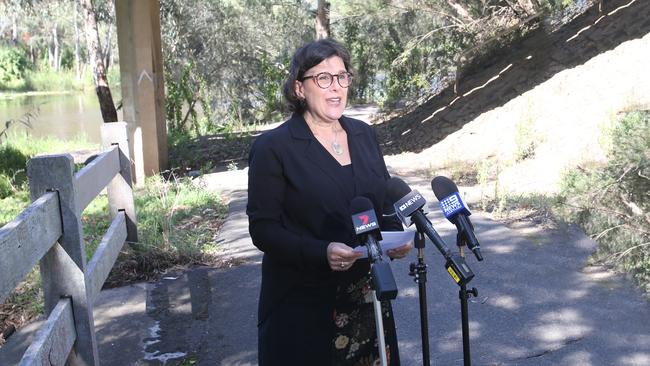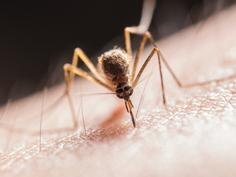Japanese encephalitis: Four new piggeries detect mosquito-borne virus
Positive detections of the Japanese encephalitis virus have been confirmed at more piggeries in Victoria after a man died from the disease.
Victoria
Don't miss out on the headlines from Victoria. Followed categories will be added to My News.
Positive detections of the Japanese encephalitis virus have been confirmed at four new piggeries in northern Victoria after a man died from the disease primary spread by mosquitoes in February.
Agriculture Victoria confirmed the detection in the Campaspe, Loddon, Gannawarra and Northern Grampians shires.
Six locations were previously confirmed in Loddon, Campaspe, Wangaratta, Gannawarra, Greater Shepparton and Greater Bendigo to have had the virus.
Health authorities are urging people to protect themselves from mosquito bites as two people remain in hospital with the virus.
Seven locally acquired cases of the brain swelling disease have been detected so far, with a number of other cases identified in NSW, South Australia and Queensland.
There are 15 confirmed cases of the virus which has killed two people, a man from northern Victoria and a man from NSW, along with a suspected third death in South Australia.
Deputy chief health officer Deb Friedman said this was the first time in the state’s history the virus had knowingly been locally acquired in Victoria.
Before February, the virus was only acquired overseas or in the Torres Strait Islands.
“We know that mosquito numbers are high in many parts of Victoria right now and this presents a higher risk of infection,” Associate Professor Friedman said.
Most people who contract the virus will have no symptoms but a small proportion of people – estimated to be about one per cent of people – will develop encephalitis.
On Friday, Associate Prof Friedman urged holiday makers to take steps to avoid mosquito-borne diseases such as the Japanese encephalitis virus and the more common Ross River virus.
“Mosquitoes can be active throughout the day, but the peak period is often around the late afternoon and into the evening as well as around dawn and dusk,” she said.
“People should wear long, loose fitting clothes and use repellents containing picaridin or DEET on exposed skin.”
Encephalitis is a severe infection of the brain characterised by symptoms including a fever with headache, vomiting, seizures and sometimes disorientation or a coma.
People who work or live outdoors, especially those employed on pig farms or spend time camping, are at most risk of the infection.

It comes as investigations continue into how the man, aged in his 60s, contracted the disease.
“Our thoughts are with his family and friends at this incredibly difficult time,” a Department of Health spokesman said.
“We strongly advise people take steps to limit their exposure to mosquitoes and avoid mosquito habitats such as stagnant water.”
Health Minister Martin Foley said the virus was a “nasty disease” which had the state government “quite concerned”.
“We’ve never really seen this virus in Victoria,” Mr Foley said on Wednesday.
On Friday, Federal Health Minister Greg Hunt announced the government would buy 130,000 additional doses of the vaccine to supplement local stocks of 15,000.
Cases of the virus have been confirmed at ten piggeries in the shires of Loddon, Campaspe, Wangaratta, Gannawarra, Greater Shepparton, Greater Bendigo and Northern Grampians shires.
The virus is transmitted by mosquitoes between pigs, humans, birds and horses, and appears to have found a foothold in northern Victoria, and parts of regional NSW and Queensland this year.
Agriculture Victoria staff are continuing surveillance activities and providing information and advice to farmers.
Chief veterinary officer Dr Graeme Cooke urged anyone who owns pigs or horses to take steps to reduce exposure to mosquitoes.
“We encourage pig farmers and horse owners to eliminate mosquito breeding grounds near their animals, such as stagnant water, to reduce the chances of them being bitten”.
Wangaratta City Mayor Dean Rees said there seemed to be little concern about the virus among the north east community but the council was monitoring the situation.
“We hold regular meetings and have discussed this with North East Health Wangaratta who have assured us they are prepared to deal with this outbreak,” Mr Rees said.
“Council undertakes regular activity to prevent mosquito breeding in the area but we have a lot of water lying around here at the moment.
“Our community spends a lot of time outdoors so we’ve advised them to take steps to avoid stagnant water pooling on their property and keep their grass short to help prevent breeding.”
A Loddon piggery operator told Leader they had received a call from Regional Development Victoria on Tuesday to touch base on the current situation and offer guidance.
“We don’t really know much about it at the moment but we’re trying to cover our own butts,” he said.
“At the moment we are pumping away pooled water and cutting down foliage on the property to reduce breeding spots and we’re going to look at starting fogging.
“We’re out in the country here, the amount of square kilometres between us and our neighbours means it will be bloody difficult to manage mosquito populations.”
Will Bennett, owner of Pig and Earth farm in Kingston, told Leader he was nervous about the spread of the virus.
“It’s making us a little bit nervous, we’re a little bit further south, so we’re a little bit protected naturally with the cooler weather, but it’s moving south because of the weather and climate change,” he said.
“We’re just trying to take precautions, not having still water around, and when we’re out with the pigs, not having shorts or shirts on.
“It’s a little bit different (for us).
“We’re small and we’re a free-range pig farm, we’ve never really had an issue with mosquitoes really.”
Climate change has also been blamed for the spread of the virus into parts of the country that have never seen cases before.
More Coverage
Originally published as Japanese encephalitis: Four new piggeries detect mosquito-borne virus




